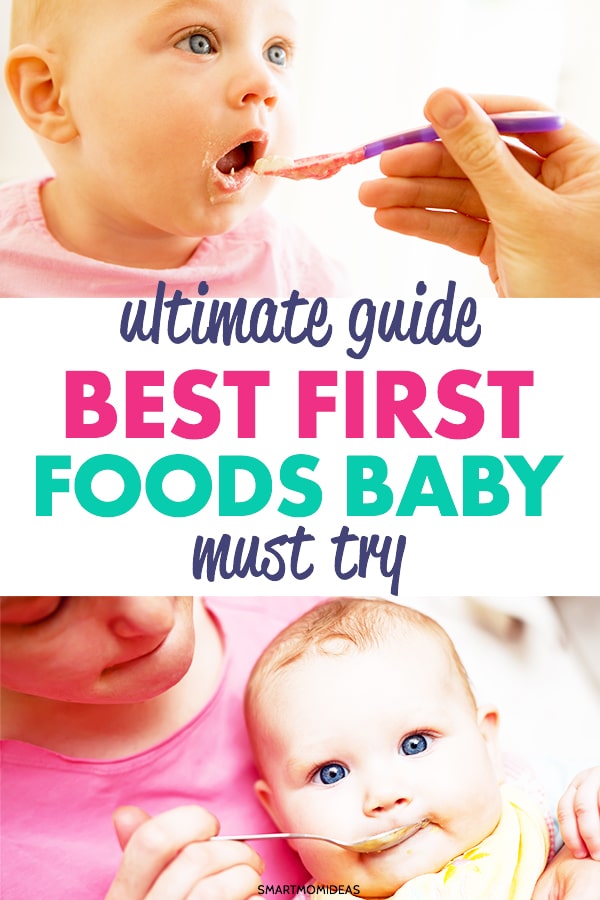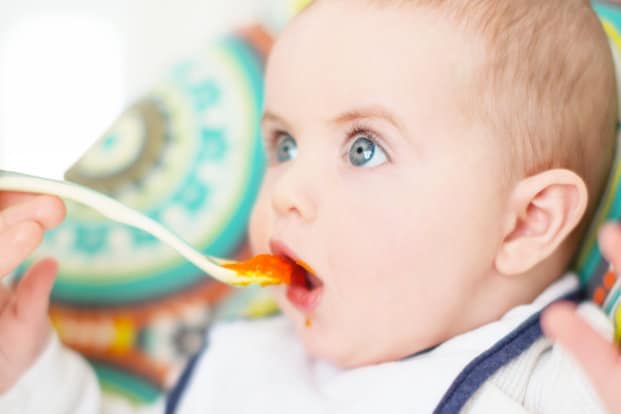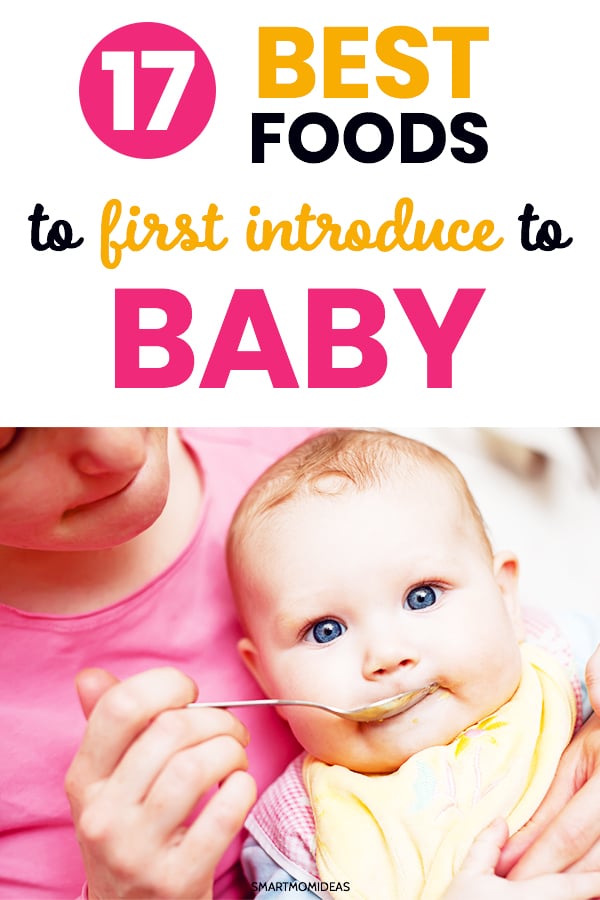Learn the first foods for baby to introduce

Isn’t it so exciting when your little one gets to try new things?
If your baby is starting to show interest in trying solid foods – generally around 4-6 months – then it might be time to expand their diet beyond formula or breastmilk.
If you have been breastfeeding you might feel that breastmilk is nature’s perfect food, right?
It is, but there are some things that breastmilk does lack, such as iron, that your baby needs to obtain from outside resources.
But, that is the perfect time to start introducing solids to your baby to ensure they have a well-rounded diet.
It is wise when introducing baby to new foods to keep a close eye to monitor any reactions they may have. It might be useful to keep track of what new foods you are introducing with a baby food journal.

First Foods for Baby
Figuring out what to feed your baby can be difficult. You have some moms tell you not to feed your baby fruit or else your baby will just crave sweet things. Other moms swear by baby led weaning and to see what your baby chooses from a plate of options.
And your mom tells you never to feed your baby eggs or other potential allergy foods.
Still others might consider rice cereal as the standard go-to for first solids.
Note: I’m not a dietician or a doctor. The information I share with you are based on my experiences, other mom’s experiences, and up-to-date information on the best foods to introduce to your baby.
The Rice Cereal Myth
Iron-fortified formulas and baby cereals have been touted as great first foods for babies, but are they really?
In short, no, they are not the best first foods for baby.
Rice cereal is often made from white, fortified rice, which hardly has any nutritional value.
Furthermore, any kind of “white” foods are known to increase blood sugars, which isn’t healthy for a baby.
You want to introduce first foods that are gentle on their stomachs and won’t have other negative side effects, like making them pre-diabetic.
Babies also do not have the proper digestive enzymes to break down grains such as rice, resulting in a very fussy baby, and nobody wants that!
Another common misconception in feeding babies their first foods is to always feed them vegetables first.
This comes with the assumption that if a baby eats something sweet, like fruits, before they are introduced to less sweet foods, they will then not want to eat their veggies.
Parents don’t need to and should not shy away from feeding their babies fruits as some of their first foods. Many fruits are very nutrient dense and great for baby.
So What Can I Actually Feed My Baby?

Well, now that we have established some of the things you should NOT be feeding your little one, let’s look at some of the things you should be feeding them.
There is a great book by Sally Fallon called Nourishing Traditions that discusses all that baby’s first foods should be, and they aren’t what you might think.
With the huge rise in allergies in children, it can be scary to introduce any new foods to them.
It may seem counterintuitive, but it is actually better to introduce children to common food allergens early on to help reduce their risk of developing allergies.
There is no need to shy away from common allergen foods, such as dairy, eggs, and peanuts.
Grains can have the opposite effect, however. According to Sally Fallon, introducing grains too early can result in grain allergies later on in life-like gluten intolerance.
Even though baby’s digestive system is not yet fully developed, it is better equipped to handle proteins and fats, but not so many carbohydrates.
Parents should also take into consideration the different types of nutrients their growing babies need, such as iron, vitamins A and D, monounsaturated fats, zinc, B6, omega 3 and 6 fatty acids, just to name a few.
Another note about allergies, feed your child one new food at a time.
This is known as a mono-diet.
This way if they have a reaction you will know exactly which food caused it. If your baby reacts negatively to a food, discontinue for a month then try again. Unless they experienced a severe reaction, in which case you should immediately consult your pediatrician.
So let’s break it down by age, what you should be feeding your baby, how you can easily prepare the food, and what you should avoid.
At the end of the post, I round up the 17 best first foods for baby!
First Food for Baby at 4 Months
You can start to introduce egg yolks to your little one as early as 4 months.
Ok, I know you may be thinking…EGGS! But cooked egg yolks are great for baby!
Although we may think cholesterol isn’t good for us (FYI, there is good and bad cholesterol), it is an important building block in your baby’s mental development.
Egg yolks from pasture-raised hens with diets high in omega fatty acids (think flax seeds and bugs…yum) are best.
Fatty acids are essentials for your child’s brain development.
It is best to avoid feeding your baby the white of the egg, however, this is made up of hard to digest proteins.
Another first food to introduce is cod liver oil. Cod liver oil is high is those much needed omega-3 fatty acids (DHA and EPA), which contributes to healthy brain development. It is also high in vitamins A and D.
How to Prepare Eggs for Your Baby
You can easily prepare egg yolks for baby by soft-boiling an egg, discarding the white (or eating it yourself) and giving baby the mashed up yolk portion. Also adding a pinch of unrefined sea salt helps with brain development by making connections that help baby think faster.
You can give baby cod liver oil in ¼ teaspoon of oil in a dropper and increase to ½ teaspoon at 8 months.
First Foods for Baby at 6 Months
At six months, you can start giving baby pureed meats. This will help to fill in the nutritional gaps in iron, zinc, and protein that are lacking in breastmilk or formula.
A great first meat to start with is liver or other organ meats. Those are very rich in iron.
This is what I did when I was introducing foods to my twins. I had my father-in-law go buy meat for his grandkids and he would always tell the cashiers,
“Only the best meat for my baby grandkids!”
There are many fruits that can be introduced to baby at this time, such as avocados, melons, papaya, and mangos (low starch fruits with high levels of carotenoids). Fruits with high-levels of pectin, such as apples, pears, peaches, mangos, and berries, should be cooked first to break down pectin. Pectin, which is a starch, is also difficult for baby to digest.
Here is a video of my twins first trying mango. There were sure a lot of grunting involved and some dancing too!
How to Prepare Meat and Fruits for Baby
Any low pectin foods can be given to baby raw and mashed up. High-starch foods should be cooked first, cooled, mashed and given to baby. Mashed bananas are also great to add in 1:1 with mashed avocados.
First Foods for Baby at 6 to 8 Months
As you introduce baby to new foods, and he or she is adjusting well, start to add more complex and foods with a variety of texture. Again, very colorful foods are excellent first choices as they are rich in vitamins and free radicals which help to fight environmental pollutants.
Some great first foods to try are sweet potatoes, carrots, and beets. However, don’t overdo it on the orange vegetables, it can be difficult for baby’s liver to convert the carotenoids into vitamin A.
Fish can also be added to your baby’s diet at this point.
How to Prepare Vegetables for Baby
Steam veggies, cool and mash. To help with absorption of all those lovely nutrients, mix in a good amount of fat, such as organic, unsalted butter, coconut oil, or ghee.
First Foods for Baby at 8 Months
You can now start to introduce baby to combined foods and dairy products.
Until this point, your baby has been mostly on a mono-diet, meaning they eat one food at a time. Now is the time to start combining foods and feeding things such as stews and soups. You can also include dairy foods such as cottage cheese, hard cheeses, cream, and yogurt (without any added sugars of course).
How to Prepare Dairy for Baby
A great way for baby to get a nutrient-packed meal is to make smoothies consisting of yogurt, banana, another fruit (mangos, papaya, avocados), a raw egg yolk, and cod liver oil.
First Foods for Baby at 12 Months and Beyond
It is wise to wait until after baby as celebrated their 1 year birthday to give them grains, nuts, or seeds.
These foods are more likely to cause digestive disturbances to little tummies. Any grains given to baby should also be whole grains, such as brown rice and oatmeal, rather than white rice or foods made with white flour.
After one year of age, babies can also be given nut butters (almond butter, peanut butter, etc), cooked leafy greens such as kale, raw vegetable salads, citrus fruits such as oranges, and whole eggs.
How to Prepare Grains, Nuts and Seeds for Baby
If possible, soak grains before cooking them. This helps to bread down harsh digestive enzymes that remain in grains, seeds, and nuts.
When preparing brown rice for example (not quick cook rice), soak for 12-24 hours in filtered water, rinse several times, then cook as you normally would.
The same process can be done for seeds and nuts.
First Foods for Baby To Avoid
- Rice cereals and grains (until after 12 months)
- Anything with added sugars or artificial sweeteners.
- Fruit juices
- Soy products
- Ultra-pasteurized dairy products
- Margarine and shortening
Best First Foods for Baby

To recap, here are the best first foods for baby to try, according to age:
- 4 months: egg yolks and cod liver oil
- 6 months: pureed organ meats, avocados, papaya, berries, bananas
- 6 – 8 months: carrots, sweet potatoes, beets, fish
- 8 months: yogurt, cottage cheese, soups
- 12 months: grains, seeds, nuts
More First Foods for Baby Tips
Every baby is different. Listen to your baby’s cues in what they like and do not like.
- Never try to force your baby to try something. If they did not like the food the first time they tried it, try again in a few days. Be persistent, but don’t force.
- Make sure not to overseason your baby’s foods. A small pinch of unrefined sea salt is more than enough seasoning.
- Let baby feel like part of the family and puree a bit of what the rest of the family is eating (without seasonings or foods that might be difficult for baby to digest).
- When baby is teething, giving them frozen finger foods, such as frozen bits of banana or yogurt, which may help soothe teething pain.
- Feed baby organic foods whenever possible.
If possible, include your baby when you eat. Even before my twins were eating solids, we always had them join us for dinner as a family. Often times my son would grab fistfuls of rice they saw eat.
Of course, he was too young to try, but I knew he was ready to try solids.
Do What’s Right For Your Family
Look – this post is only a suggestion and a guideline of best practices. While I never used rice cereal for my twins, it’s up to you and your family on what you choose for your first food to try.
My twins’s very first food (at around 5 months) was avocado. My son didn’t really like it, but my daughter did.
Five years later, my son doesn’t like avocado, but my daughter loves it!
So, the first foods you try do have an impact on what they will enjoy eating as a toddler.
I never fed my twins nuts or eggs at an early age. My son doesn’t like eggs (even though I’ve tried introducing eggs in his diet for years) and my daughter is okay with them, but doesn’t jump for joy when I give her a hard-boiled egg for lunch.
The time you introduce solids is a big transition and pivotal to a healthy eating plan in the future.
Give your baby the best chance for a healthy lifestyle with the very first food you try!
Over to you –
What was the first food you tried to give your baby? Did they like it or shun away? Share your experiences with transitioning to solids in the comments!
Please remember to pin me!






Leave a Reply